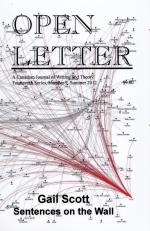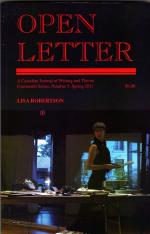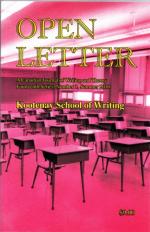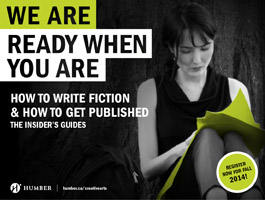The most interesting magazine produced by the [TISH] alumni is Open Letter, begun in 1965 and continuing to this day, and edited by Frank Davey, with a varying group of contributing editors or associate editors (initially George Bowering, David Dawson and Fred Wah; currently George Bowering, Steve McCaffery, bpNichol and Fred Wah). Open Letter is a review ?of writing and sources,? and it provides a forum for critical theory and evaluation. It has become the most important avant-garde periodical in Canada; it has sought to bring together all the different strands of experimentation and to unify them in a single web against the mainstream of Canadian writing.
In fifteen years of existence, Open Letter has changed its format, but it maintains its purpose, which was explained in the first editorial: the magazine would be ?an attempt to combine within the pages of a periodical the features of both a symposium and a debate.? Frank Davey wrote the first editorial:
The subject will be poetry and its medium, language. The debaters will be the editors, myself, George Bowering, David Dawson, and Fred Wah?.
Fifteen hundred years finds the total magic of the English language still untapped, and so will fifteen million. The power of the written sign is always open, always unexplored. The Open Letter begins its explorations with letters from its editors to each other, letters that describe the points they have reached so far in their lives with language. It is from these pots that The Open Letter will start to measure its progress.
To anyone unfamiliar with current North American poetry, Davey notes, ?the Open Letter will present an ostensibly private world of baffling values, problems, place-names, and personages.? The sense of a ?private world? has always been inherent to Open Letter.
— Ken Norris, The Little Magazine in Canada 1925-80 (ECW Press, 1984)
Edited and published by Frank Davey, Open Letter: A Journal of Writing and Theory has been called ?the most important avant-garde periodical in Canada.? (Ken Norris, The Little Magazine in Canada 1925-80), ??one of the most advanced journals of its kind anywhere in the world?? (Wynne Francis, The Oxford Companion to Canadian Literature), ??the most indispensable journal in Canlit? (Nicky Drombolis, George Bowering Condensed), ?Canada?s most important forum for discussion and examination of innovative and experimental ideas and texts.? (Gregory Betts, The Canadian Encyclopedia) and ?Canada?s most intriguing critical journal, at least where poetry is concerned? (Sina Queyras, Lemonhound, January 8, 2023). With its entire run overseen by Davey, Open Letter will be ending its run sometime over the next few months.

Originally founded by Davey in Victoria, B.C., in 1965, while working on his PhD on the poetics of the Black Mountain Poets, Open Letter has enjoyed nearly 50 years of continuous publication, more than half of which has been in and around London, Ontario. The journal moved as Davey did, from the beginning of his long tenure at York University in Toronto starting in 1971, to 1990, when he was named the first Carl F. Klinck Professor of Canadian Literature at the University of Western Ontario (now Western University) in London, Ontario. Throughout these shifts, one can easily see how Open Letter followed as an extension his own extensive literary and critical projections, production and interests, whether his long association as an editor at Coach House Press or his critical work, including Five Readings of Olson?s Maximus (1970), Earle Birney (1971), From There to Here: A Guide to English-Canadian Literature Since 1960 (1974), Louis Dudek and Raymond Souster (1980), Surviving the Paraphrase (1983), Margaret Atwood: A Feminist Poetics (1984), Reading Canadian Reading (1985) and Canadian Literary Power (1994).
Originally conceived as an open dialogue with fellow poets George Bowering, Fred Wah and David Dawson, Open Letter focused on the poetics of the Canadian avant-garde, providing a critical extension to previous work the four had done as part of the Vancouver newsletter TISH. The journal quickly expanded into lengthy explorations into various directions in literary and scholarly writing that simply weren?t being covered anywhere else, while retaining a strong foundation of modernism and postmodernism and an essential forum for the critical exploration of experimental Canadian writing. Over the years, various writers, poets and critics have contributed regularly to Open Letter, including the late Toronto poet bpNichol who regularly explored ideas through his Open Letter essays that might not otherwise have seen print, or possibly been composed. A whole series of collaborative essays between Nichol and Steve McCaffery under the name The Toronto Research Group were composed specifically for the journal. Davey writes of the journal on the Open Letter website:
Behind such praise has been an Open Letter history of leadership among Canadian literary publications. In the 1970s it was one of the first to regularly review Canadian small press titles; it was one of the first to publish phenomenological criticism; and one of very few to publish translations of theoretical writing by Quebec avant-garde writers like Paul Chamberland, Raoul Duguay and Michèle Lalonde. It gave first publication to Dennis Lee?s now well-known essay ?Cadence, Country, Silence,? and to Sheila Watson?s short story ?The Rumble Seat? and essays on Wyndham Lewis. In the 1980s it produced several important special collections — a collection of ?pataphysical texts (1981), Louis Dudek?s ?Texts and Essays? (1981), Bruce Barber?s collection of essays on performance art (1983), a collection of essays on Robert Kroetsch (1984), the proceedings of the Longliners Conference on the Canadian long poem (1985), a collection of essays by Robert Kroetsch (1983) that in 1989 was re-printed in an expanded edition by Oxford University Press, a festschrift (1986) on bpNichol, and a collection of essays (1987) on Steve McCaffery. Throughout its history, as in its performance art issue, issues on Barbara Caruso (1986), Victor Coleman (1988), and on three British painters (?Between Poetry and Painting,? 1978), as well as in numerous essays in other issues, Open Letter has attempted to keep open the conceptual links between writing and the visual arts. Many of the above have been issues — particularly the ones focused on ?pataphysics, performance art, the work of Victor Coleman, Sheila Watson, Barbara Caruso, Steve McCaffery, and bpNichol — that scholarly journals at the time would have been unlikely to consider publishing.
As much as the journal has long existed as a conversation, it has existed also as an introduction, opening conversation on Canadian ?pataphysics, contemporary writing out of Quebec, feminist writing, poststructuralist works, considerations of the long poem and language writing, as well as concrete and visual works." What is impressive about the run of the journal is in how it has not only maintained an argument about writing for nearly five decades, but helped encourage and even shape one as well.

With very few ?open issues? over the past few years, Open Letter has been focusing more heavily on the guest-edited issue, and the last couple of years have seen issues such as ?Beyond Stasis: Poetics and Feminism Today,? guest-edited by Kate Eichhorn and Barbara Godard (Thirteenth Series, Number 9, Summer 2009), ?Remembering Barbara Godard,? guest-edited by Jennifer Henderson, Eva C. Karpinski, Ian Sowton and Ray Ellenwood (Fourteenth Series, Number 6, Summer 2011), ?Breakthrough Nostalgia: Reading Steve McCaffery Then and Now,? guest-edited by Stephen Cain (Fourteenth Series, Number 7, Fall 2011), ?Negotiating the Social Bond of Poetics,? guest-edited by Nancy Gillespie and Peter Jaeger (Fourteenth Series, Number 8, Spring 2012), ?Gail Scott, Sentences on the Wall,? guest-edited by Lianne Moyes in collaboration with Bronwyn Haslam (Fourteenth Series, Number 9, Summer 2012) and the most recent ?Olson @ the Century,? guest-edited by Steve McCaffery (Fifteenth Series, Number 2, Spring 2013).
rob mclennan: I can only imagine the journal lasted as long as it has by being an extension of your own writing practice, critical practice and teaching work. How did, on the other hand, Open Letter drive your own work?
Frank Davey: As you probably know, I began OL in 1965 to extend the original TISH — to create a kind of virtual TISHcollaboration despite the geographic separation of myself, Bowering, Dawson and Wah. That worked for Bowering and me into the early '70s, which I think you can see in the poetry collections we published, and see also in some overlap in the middle '70s between his fiction and my book-length poems — a period in which we were both reading Barthelme, Hawkes and Sukenick as well as theorists such as Barthes and Bachelard. Barbara Godard, my colleague at York U., was in the mix too at that point, and soon the OL scene included the Coach House Quebec Translations series she and I directed, with the poetry and fiction of Nicole Brossard bringing Wah back in at least as a reader & Kootenays organizer. And bpNichol was now part of it also, and in a short while Steve McCaffery. I think much of my writing here was, it had been in the TISH days, pushed — driven you say — by the intense circulation and evolution of ideas such interactions enabled. I can?t imagine having written Capitalistic Affection!, The Abbotsford Guide to India or Postcard Translations outside of that scene.
It of course came to a sudden end with the collapse of Coach House, the death of bp, the fading of Underwhich and the swerve toward multiculturalism, gender parity and racialization. Art had to understand these at least as part of its ecology, its politics and its materials, which is what the last two decades of Open Letter has largely concerned, with Barbara central in this effort. Spinning from this in my own writing were Canadian Literary Power, Cultural Mischief and Popular Narratives. Both Barbara and I were aware of the zeal of the writers newly enabled by the ethical/postcolonial swerve to implicitly devalue previous writing (something you see in Butling and Rudy?s attempts in their book Writing in Our Time to occupy the concept ?radical poetry?) and of the need to keep longer histories in view.
rm: Much has been documented about the first few decades of the journal and the positive effects it?s had on Canadian writing, but far less on the past 20 years. How do you feel about the past two decades of the journal, from the content of the issues to the interaction it?s had with a newer generation of Canadian writers, critics and students?

FD: Which newer generation I wonder. I think that after bp died OL was caught up in the struggle among writers to be the newer generation. That struggle was similar to that evident in issue 10:4 (Fall 1998) between the humanists and the anti-humanists for the Nichol corpus. OL itself, with the ?notayshun? issues Nichol had assembled, had leaned toward finding content through formal experiment and through the interrogation of language, but in the early 1990s there emerged numerous young writers who believed that ethical issues of sexuality, "colour," race, gender should drive both content and form. At the same time writers influenced by McCaffery, the ?pataphysical Nichol and by the Language writers came on the scene — Derksen, Bök, Wershler, Karasick, Jaeger, Robertson, Cain, Mac Cormack. At an extreme the contrast was between the idea the writing can be ?prior to meaning? or irrelevant to meaning and the idea that only writing that makes an ethical contribution to civilization is worth reading and studying. At a lesser extreme, the contrast was between writers for whom the primary motivation to write was to deal with social issues and ones for whom the primary motivation was to deal with language issues. So you get the two: ?Wanting it Other/Wise: Race, Sexualities, Bodies, Texts? (you see which word here comes last), guest-edited by Susan Rudy, followed in two years by ?Millennial ?Pataphysics,? guest-edited by Bök and Wershler. You see Derksen?s ?Disgust and Overdetermination? issue in 1997 followed immediately by the two thematically activist ?DeScribing Albertas? issues guest-edited by Janice Williamson. In 2000 you get the two ?The Body Chronic? issues guest-edited by Larissa Lai and Aruna Srivastava followed by Darren Wershler?s ?Cyberpoetics? issue and soon after by Louis Cabri and Nicole Markotic?s ?Open Letter Open Letter? issues. Calgary (which began the emphasis on ethical positioning in 1991 with Susan Rudy, Ashok Mathur and Fred Wah?s ?Interventing the Text? issue) tended to be working here against McCaffery, Ontario and [the Kootenay School of writing in British Columbia], although there was often a semblance of cooperation, because for the latter a critical engagement with language usage can lead to critiques of economics and politics, and for the former a new emphasis on previously repressed social issues can require or enable new literary structures. But the core issues, in my view, were unresolvable, as I suggested in my essay on the Four Horsemen in Diana Brydon and Marta Dvorak?s anthology Crosstalk — although the interactions could result in highly innovative texts
I think the OL issues from 2005 onward are stronger as a group than the 1990-2005 ones — particularly the issues edited by Tostevin, Jaeger and Godard, the Goldsmith, Ellenwood and the Artist?s Statements issues, the three Nichol issues, the KSW, Lisa Robertson and Gail Scott issues. They are also closer to OL?s subtitle ?A Canadian journal of writing and theory.?
rm: What are you most proud of over the journal?s nearly 55-year run? What are you most frustrated or troubled by?
FD: I take some satisfaction in the journal?s having kept the politics of aesthetics and language usage in view in Canada for so long, as well as the understanding that writing doesn?t have to be measured in terms of grand themes and brilliant individual careers. Writing can be a loosely collaborative activity aimed at keeping the language sharp and fresh. The popular CBC-Giller-Adrienne Clarkson understanding of literature is sentimental and thematic — seeing writers as wonderful individuals who increase humanity?s understanding of itself, testify bravely to social abuses and make Canada a "better" place that Canadians can feel warm and fuzzy about. That wasn?t OL. Frustrated? The writing community that supported OL with contributions and expressions of gratitude supported it much less through subscriptions. I think the split I mentioned earlier hurt OL — readers who appreciated the ?Millennial ?Pataphysics? issue or the ?Contemporary Visual Poetry? issue may not have wanted to have the ?Wanting it Other/Wise? issue on their bookshelves, and vice versa. So they would buy individual issues rather than subscribing.
rm: With the journal behind you, what are you planning on next?
FD: More writing — I have a backlog of half-completed projects. I need to solve the distribution problem of my colour visual poems. Maybe I?ll take your lead and write a blog.
Born in Ottawa, Canada?s glorious capital city, rob mclennan currently lives in Ottawa. The author of more than 20 trade books of poetry, fiction and non-fiction, he won the John Newlove Poetry Award in 2011, and his most recent titles are the poetry collections Songs for little sleep, (Obvious Epiphanies, 2012), grief notes: (BlazeVOX [books], 2012), A (short) history of l. (BuschekBooks, 2011), Glengarry (Talonbooks, 2011) and kate street (Moira, 2011) and a second novel, missing persons (2009). An editor and publisher, he runs above/ground press, Chaudiere Books (with Jennifer Mulligan), The Garneau Review (ottawater.com/garneaureview), seventeen seconds: a journal of poetry and poetics (ottawater.com/seventeenseconds) and the Ottawa poetry pdf annual ottawater (ottawater.com). He spent the 2007-8 academic year in Edmonton as writer-in-residence at the University of Alberta, and regularly posts reviews, essays, interviews and other notices at http://robmclennan.blogspot.ca/.


Wonderful piece rob and Frank. Does it really have to end? I hope another worthy critical journal emerges willing to address multiple perspectives on poetry.
Laurie Fuhr
Post new comment